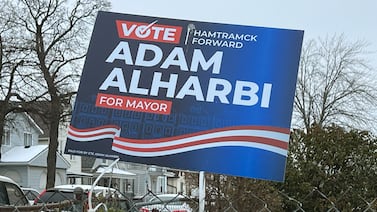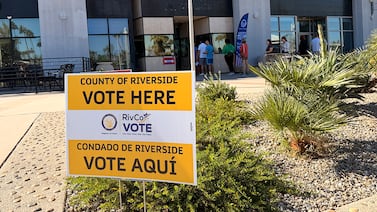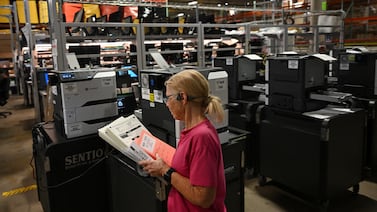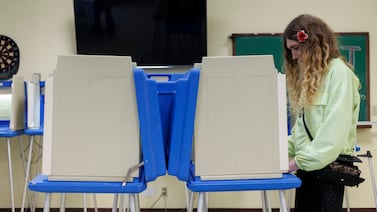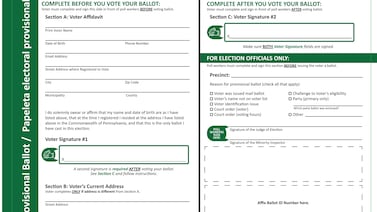Votebeat is a nonprofit news organization reporting on voting access and election administration across the U.S. Sign up for our free newsletters here.
Arizona has fixed a looming crisis for the election in a way that election officials say will allow them to submit presidential results to Congress in time. Republicans are touting the fix as a boon for election integrity, and Democrats say it protects voters in the long run.
State lawmakers voted nearly unanimously Thursday in favor of a bill meant to fix the problem by altering several deadlines in state law, including moving the primary election up a week to July 30. The vote came after months of fraught negotiation and a final, painstaking week of closed-door deliberations, and a couple of the negotiators teared up as they realized the bill would become law.
The legislation, HB2785, also includes several smaller changes that will produce faster final results, including one controversial change that will give voters fewer business days to respond if county officials see a problem with the signature on their mail-in ballot.
Coming to an agreement was a feat for the closely divided Legislature, which Republicans control by just one seat in each chamber. Lawmakers last year failed to advance any major election bills that Gov. Katie Hobbs, a Democrat, was willing to sign.
But Hobbs praised the bipartisan solution on Thursday, and her office said she would likely sign the bill Friday.
“Arizonans can rest assured that their voices will be heard and that our elections will run free of political interference,” Hobbs said in a statement.
Lawmakers were under pressure to act after recent changes to state and federal law juxtaposed in a way that made the state’s election timeline unworkable. In 2022, state legislators tightened the threshold that triggers automatic recounts in a way that ensures statewide recounts will be common and Maricopa County, at least, expects a recount after every election. Meanwhile, changes to federal law pushed up the date when states’ presidential election results must be final.
The fix came just in time: Election directors said that the last possible date to move the primary election was Feb. 9. After that, it would be too late to change the cascading deadlines that dictate how elections are run.
But negotiations over a fix dragged out. Republicans tried to use the dilemma as leverage to advance election-related measures they have wanted for years but that weren’t related to the timeline problem, and Democrats balked, saying the proposals would negatively affect voters.
Republicans did win one major battle, putting into law specific requirements for how officials must verify voter signatures on mail-in ballots. County recorders that control this process said it won’t change how they do their job.
State Rep. Alex Kolodin, who carried the Republican bill to the finish line this week, said upon voting that even though Republicans had to “give up things we didn’t want to give up,” they still secured changes grassroots groups have wanted for years.
State Rep. Laura Terech, who helped lead negotiations for Democrats, said she has barely eaten or slept this week. Watching from the Senate gallery, she said she began crying as the “yes” votes came up on the board. “I was so relieved,” she said.
A key to winning votes for the deal was making some of the changes temporary. For example, the primary date is changing for this year only. And the change to the length of time voters have to respond to problems with their mail-in ballot signature, from five business days to five calendar days, is only in effect through the 2026 elections. Then, it reverts back to five business days.
These temporary changes will allow lawmakers to gauge how the changes are working. But it also means that county officials will need to advocate in 2026 for a longer-term solution, said Jen Marson, executive director of the Arizona Association of Counties, who represented county election officials in the negotiations.
Still, Marson said she was glad that there was a fix for this year, and stressed that it was satisfying to watch everyone work together. Marson often takes heat from Republican lawmakers during legislative sessions as she explains why election officials are opposed to proposed changes.
“It was very satisfying. I’m actually pretty emotional about the whole thing, honestly,” Marson said, choking up. “It’s very nice to see everybody come together.”
“Voters > power grabs”
Election directors sounded the alarm last fall on the timeline problem, saying the expected recounts would push the primary results so late that officials would miss the deadline to send mail ballots out to military and overseas voters in the general election. They warned that the recounts also would push general election results so late, they wouldn’t meet the federal deadline for sending presidential results to Congress.
Election officials called for a special session in the fall, or in early January, to fix the problem quickly. That didn’t happen, but the fractious negotiations continued.
Marson said there has not been one easy week since negotiations began. Eventually, on Monday, Kolodin and Terech introduced two separate bills on the week of the deadline.
Democratic lawmakers were not supportive of the change that reduces the so-called “curing” period for mismatched signatures from five business days to five calendar days. While most recorders were OK with it, the idea did concern Pima County Recorder Gabriella Cazares-Kelly, who said Monday she thought it would reduce the ability of rural and tribal voters, especially, to respond to the county and ensure their ballot is counted because of their reliance on public transportation and public wifi at libraries, both which will be unavailable on weekends when the curing period now ends.
“Taking a day away from a cure period could have significant impact,” she said.
The agreement requires county offices to stay open on the weekend for signatures to be cured, and requires the officials to give political parties a list of voters that need to correct signatures earlier and more frequently than is typical, so they can also try to reach those voters.
Democrats also pointed to the signature verification requirement changes as one way Republicans were trying to muddy what they said should be a clean fix to the problem sparked by the recount law.
At a news conference Monday morning, voting rights groups gathered with Democratic state lawmakers holding signs that said “voters > power grabs.” State Sen. Priya Sundareshan, a Democrat, said at the podium that Republicans were trying to “Christmas tree” their proposal.
Kolodin said Monday that the changes he was proposing to signature verification were non-negotiable. “It will now be coming out only over my dead body,” he wrote in a statement.
Lawmakers, county and state officials – including Hobbs – gathered in the basement of the Capitol on Tuesday night to negotiate out of the public eye. Sundareshan said she left that meeting unsure whether an agreement would be reached.
When Kolodin got to the Republican caucus meeting on Wednesday, he wasn’t happy. He had agreed to remove from his bill a Republican proposal that would have moved the primary election to May starting in 2026, and one that would have closed high schools on Election Day so they could be used as polling places.
He gripped the podium tight and raised his voice as he went back and forth between urging his colleagues to vote for the bill on Thursday and saying how angry he was about the concessions he had felt pressured to make when negotiating with Democrats to keep the bill alive.
“I just want to pull the freakin’ bill, just because I’m so pissed,” Kolodin said.
Some representatives told him the last-minute nature of the bill and its amendments were concerning them. One, state Rep. Matt Gress, told him he was “deeply concerned,” in part because the legislation didn’t do much to speed up ballot counting.
Arizona allows voters to drop off mail-in ballots at polling places on Election Day. Those ballots then must have their signature checked after polls close, which in populous Maricopa County slows counting considerably. The new law allows voters, starting in 2026, to show an ID to bypass the signature check, but it doesn’t require them to do this, which Gress thought it should.
It was unclear whether Hobbs would sign the bill because of the new requirements for verifying voter signatures. She vetoed a bill to put these requirements into law last year.
The changes require county officials comparing the voters’ signature with signatures from their voter record to use a list of specific characteristics, the way loops are written and the way the signature trails off, to confirm that the voter was the one who signed the envelope that contains their mail-in ballot. This is a list that county officials already use to train workers that review signatures, but it’s currently a recommendation and not a requirement.
The bill includes last-minute amendments that, presumably, helped win Hobbs’ support. For example, it specifies that the past and current signatures don’t have to match exactly, and that workers don’t need to consider each characteristic one at a time.
These changes will make it harder for candidates to challenge election results in court based on a claim that workers did not diligently review signatures, as GOP gubernatorial candidate Kari Lake unsuccessfully tried to do after her 2022 election loss to Hobbs.
Other small changes will have more effect on those administering elections than those voting.
For election officials, the new law means having less time to proof ballots before they are sent to voters. They will be required to prepare their final results more quickly for certifying, and will have less time to research the status of voters who cast provisional ballots. They will, though, be able to submit results to the state electronically instead of driving to Phoenix to deliver them in person, as the law currently requires.
County supervisors, under the agreement, will not be able to postpone certifying the results for any reason – state law currently allows for a short postponement in specific circumstances when results are missing.
The agreement speeds up the process of recounts, but it doesn’t change the threshold that triggers an automatic recount, which means Maricopa County, at least, will still likely see recounts after every election.
But it does tell candidates involved in these tight races that they can opt out of having the recount completed, if they choose.
Jen Fifield is a reporter for Votebeat based in Arizona. Contact Jen at jfifield@votebeat.org.

